unit9八上
人教版八年级英语上册unit 9知识点归纳
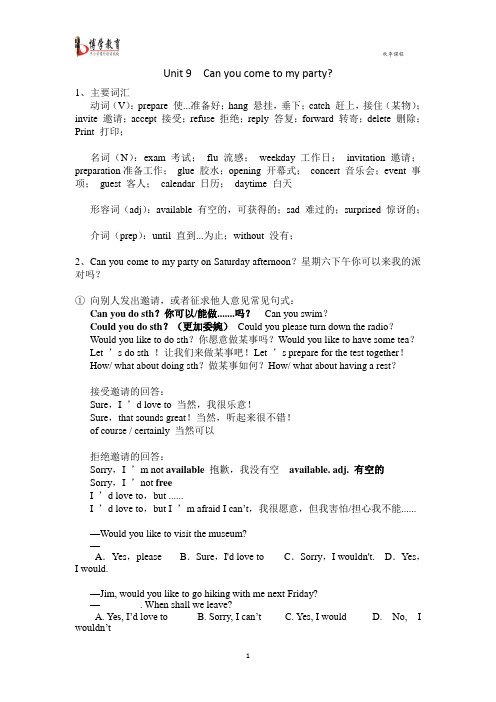
Unit 9 Can you come to my party?1、主要词汇动词(V):prepare 使...准备好;hang 悬挂,垂下;catch 赶上,接住(某物);invite 邀请;accept 接受;refuse 拒绝;reply 答复;forward 转寄;delete 删除;Print 打印;名词(N):exam考试;flu流感;weekday 工作日;invitation 邀请;preparation准备工作;glue 胶水;opening 开幕式;concert 音乐会;event 事项;guest 客人;calendar 日历;daytime 白天形容词(adj):available 有空的,可获得的;sad 难过的;surprised 惊讶的;介词(prep):until 直到...为止;without 没有;2、Can you come to my party on Saturday afternoon?星期六下午你可以来我的派对吗?①向别人发出邀请,或者征求他人意见常见句式:Can you do sth?你可以/能做.......吗?Can you swim?Could you do sth?(更加委婉)Could you please turn down the radio?Would you like to do sth?你愿意做某事吗?Would you like to have some tea?Let ’s do sth !让我们来做某事吧!Let ’s prepare for the test together!How/ what about doing sth?做某事如何?How/ what about having a rest?接受邀请的回答:Sure,I ’d love to 当然,我很乐意!Sure,that sounds great!当然,听起来很不错!of course / certainly 当然可以拒绝邀请的回答:Sorry,I ’m not available抱歉,我没有空available. adj. 有空的Sorry,I ’not freeI ’d love to,but ......I ’d love to,but I ’m afraid I can’t,我很愿意,但我害怕/担心我不能......—Would you like to visit the museum?—______A.Yes,please B.Sure,I'd love to C.Sorry,I wouldn't. D.Yes,I would.—Jim, would you like to go hiking with me next Friday?—________. When shall we leave?A. Yes, I’d love toB. Sorry, I can’tC. Yes, I wouldD. No, I wouldn’tTom______(can)come to my party because he is ill.②on Saturday afternoon在星期六下午在表示具体某天时,前面要用介词onOn weekend 在周末On Monday 在星期一On December 1st在12月1号On Wednesday morning/afternoon/evening 在周三早上/下午/晚上—My mother is ill.I have to look after her at home.—______.A.Thank you B.Oh,I don't know C.Bad luck D.I'm sorry to hear that3、prepare for an exam 为考试准备Prepare for... 为...而准备I can’t go with you because I have to prepare for the coming test我不能和你一起去,因为我必须得为即将到来的考试做准备Prepare sb for sth 使某人为某事做好了准备We must prepare ourselves for the meeting我们必须使我们自己为这次会议做好准备Prepare sth for sb 为某人准备好了某物Mom prepares a delicious meal for us 妈妈为我们准备了好吃的饭菜Prepare to do sth 准备做某事I prepare to take a trip in Taiwan 我准备去台湾旅游4、exam 是examination的缩写,意为“考试”Test ,也是“考试”的意思Take / have an exam 参加考试Pass the exam 通过考试/ 考试及格Fail the exam 考试不及格5、go to the doctor 去看医生6、Have the flu 患流感/感冒了Have的原意,“有”Have English class 上英语课Have breadfast 吃早餐Have a cold 感冒have a fever 发烧have a headache头痛Have a cough咳嗽have a sore throat喉咙痛have a toothache牙痛7、Sam isn’t leaving until next Wednesday 萨姆不会离开直到下周三为止萨姆下周三才会离开Until 直到......为止Not......until...... 不会做某事直到......为止直到......才......The noise didn’t stop until midnight 噪音直到午夜才停止She won’t forgive us until we say sorry to her 我们道歉前她是不会原谅我们的I waited until three o’clock 我们一直等到三点钟He lived with his parents until he got married 他结婚前一直和父母住在一起8、Can you hang out with us on Monday night?周一晚上你可以陪我们一起逛逛吗?Hang out with sb 和某人一起闲逛Hang out 闲逛/逛街He likes reading and he often hangs out in the bookstores他喜欢阅读所以经常在书店闲逛Hang,动词,“悬挂”,hang-hungHang the picture on the wall 把这幅画挂在墙上9、I’m afraid not 恐怕不能Afraid,形容词,意为“害怕的”否定时:I ’m afraid not 恐怕不能肯定时:I ’m afraid so 恐怕如此—Can you go to the concert?你能去听音乐会吗?—Sorry. I ’m afraid not 对不起,恐怕不能—Has she missed the bus?她错过公交了吗?—I ’m afraid so 恐怕如此/恐怕是这样没错10、invite,动词,意为“邀请”I nvite sb to sp,邀请某人到某地My pen pal invites me to his hometown 我笔友邀请我去他的家乡Invite sb to do sth,邀请某人做某事Mr.Kim invites us to have dinner with him 金先生邀请我们和他一起共用晚餐Invite(v)→invitation(n)邀请My best friend often invites me ______ delicious food.A.enjoy B.enjoying C.enjoyed D.to enjoy11、accept,动词,接受Accept的近义词是receive,但二者有所区别accept 与receive的区别:accept 意为“接受”指主观上原意接受receive 意为“收到”指客观上收到或拿到某样东西She accepted my apology她接受了我的道歉He received many letters from his family他收到很多来自家里的信件Receive letter from sb 收到某人的信I received his gift yesterday,but I wouldn’t like to accept it昨天我收到了他的礼物,但是我不想接受它12、refuse,动词,拒绝accept 的反义词Refuse sth 拒绝某物He rufused the invitation from Tony 他拒绝了Tony的邀请Refuse to do sth 拒绝做某事You should’t refuse to help her 你不应该拒绝帮助她13、the day before yesterday昨天(过去式)the day after tomorrow 后天(将来时)He went for Beijing the day before yesterday 他昨天去北京了Sarah will go for Beijing the day after tomorrow萨拉后天去北京—My father is coming back on Wednesday.—Oh, today is Monday, so you can see your father ______.A. todayB. the day before tomorrowC. tomorrowD. the day after tomorrow14、weekday 与weekendWeekday 工作日(周一至周五其中一天)Weekend周末(周六至周日)15、What ’s today?直译:今天是什么?引申:今天是什么日子?What ’s today?用来提问今天是几号、星期几。
人教版英语八上unit9 单词和词组汇总

51. reply to 对…进行回复
hang 悬挂;垂下
hang out闲逛;常去某处
hang out闲逛;常去某处
catch 及时赶上;接住 ;抓住
invite
邀请
accept
接受
refuse
.拒绝
the day before yesterday前天
the day after tomorrow后天
weekday 工作日(星期一到星期五的任何一天)
look after照顾;照料
invitation 邀请;请柬
turn down拒绝
reply 回答,回复
forward 转交;发送,adv.向前,前进
delete .删除
print打印;印刷
sad 令人)悲哀的;(令人)难过的
goodbye再见
take a trip去旅行 glad 高兴;愿意
help out(帮助……)分担工作、解决难题
preparation 准备,准备工作
glue 胶水
without 没有;不(做某事)
surprised 惊奇的;感觉意外的
look forward to盼望;期待
hear from接到(某人的)信、电话等
calendar 日历,日程表
daytime
白天;日间
housewarming
.乔迁聚会
opening 开幕式,落成典礼
19. catch the early bus 赶上早班车 catch up with sb 赶上某人
20. finish doing sth 结束做某事 21. plan to do sth 计划/打算做某 ( planning) 22. invite sb to do sth 邀请某人做某事 23. refuse to do sth 拒绝做某事 25.play soccer 踢足球 26. have a piano lesson 上钢琴课 27. look after= take care of 照顾
英语八年级上册Unit 9重点知识及短语归纳
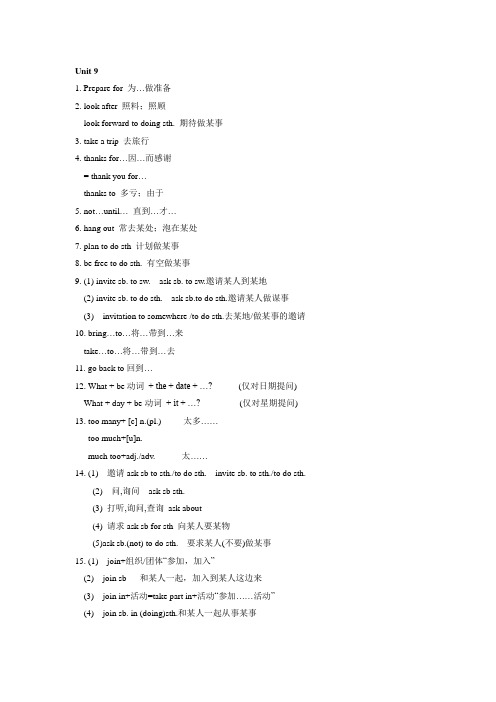
Unit 91. Prepare for 为…做准备2. look after 照料;照顾look forward to doing sth. 期待做某事3. take a trip 去旅行4. thanks for…因…而感谢= thank you for…thanks to 多亏;由于5. not…until…直到…才…6. hang out 常去某处;泡在某处7. plan to do sth 计划做某事8. be free to do sth. 有空做某事9. (1) invite sb. to sw.---ask sb. to sw.邀请某人到某地(2) invite sb. to do sth.---ask sb.to do sth.邀请某人做谋事(3) invitation to somewhere /to do sth.去某地/做某事的邀请10. bring…to…将…带到…来take…to…将…带到…去11. go back to回到…12. What + be动词+ the + date + …?(仅对日期提问) What + day + be动词+ it + …? (仅对星期提问) 13. too many+ [c] n.(pl.) 太多……too much+[u]n.much too+adj./adv. 太……14. (1) 邀请ask sb to sth./to do sth.---invite sb. to sth./to do sth.(2) 问,询问ask sb sth.(3) 打听,询问,查询ask about(4) 请求ask sb for sth 向某人要某物(5)ask sb.(not) to do sth. 要求某人(不要)做某事15. (1) join+组织/团体“参加,加入”(2) join sb 和某人一起,加入到某人这边来(3) join in+活动=take part in+活动“参加……活动”(4) join sb. in (doing)sth.和某人一起从事某事。
八年级英语上册第9单元单词、短语和重点句型
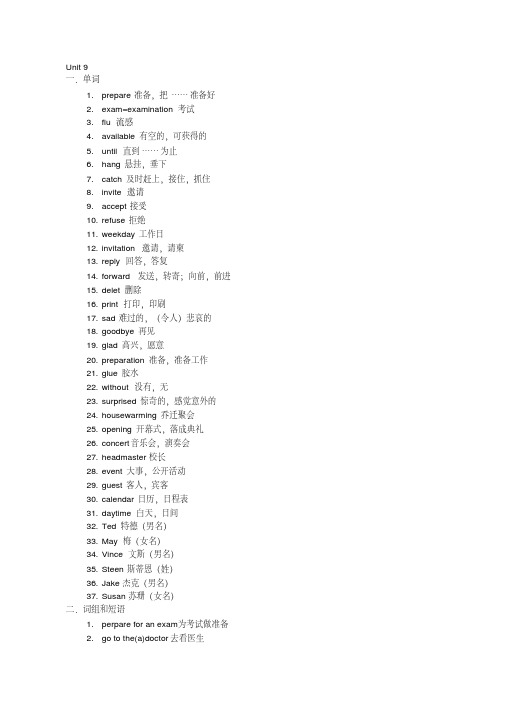
Unit 9一.单词1.prepare 准备,把……准备好2.exam=examination 考试3.flu 流感4.available 有空的,可获得的5.until 直到……为止6.hang 悬挂,垂下7.catch 及时赶上,接住,抓住8.invite 邀请9.accept 接受10.refuse 拒绝11.weekday 工作日12.invitation 邀请,请柬13.reply 回答,答复14.forward 发送,转寄;向前,前进15.delet 删除16.print 打印,印刷17.sad 难过的,(令人)悲哀的18.goodbye 再见19.glad 高兴,愿意20.preparation 准备,准备工作21.glue 胶水22.without 没有,无23.surprised 惊奇的,感觉意外的24.housewarming 乔迁聚会25.opening 开幕式,落成典礼26.concert 音乐会,演奏会27.headmaster 校长28.event 大事,公开活动29.guest 客人,宾客30.calendar 日历,日程表31.daytime 白天,日间32.Ted 特德(男名)33.May 梅(女名)34.Vince 文斯(男名)35.Steen 斯蒂恩(姓)36.Jake 杰克(男名)37.Susan 苏珊(女名)二.词组和短语1.perpare for an exam为考试做准备2.go to the(a)doctor 去看医生3.another time 其他时间,别的时间4.hang out 闲逛,常去某地5.the day before yesterday 前天6.the day after tomorrow 后天7.look after (my little cousin)照顾(我的小表弟)8.turn down 拒绝9.take a trip 去旅行10.help out (帮助……)分担工作,解决难题11.look forward to (doing sth)盼望,期待(做某事)12.hear from 收到(某人的)信,电话等)13.have the flu患流感14.on Saturday afternoon在星期六下午15.thanks for asking 谢谢邀请16.go bike riding 骑自行车17.catch you 再见!18.plan to do sth 计划做某事19.refuse to do sth 拒绝做某事20.be available to do sth 有时间做某事21.make an invitation 邀请,发出邀请22.at the end of this month 在这个月末23.have a surprise party for sb 为某人举办一场令人惊喜的聚会24.invite sb to do sth 邀请某人做某事25.be surprised to do sth 对做某事感到意外的开幕式,……落成典礼26.the opening of ……27.on the morning of Wednesday 在星期三的早上28.reply in writing to 对……作书面回复29.go to the concert 去听音乐会三.句型1.Can you come to my party on Saturday afternoon?星期六下午你能来参加我们的聚会吗?Sure,I love to.当然了,我愿意去。
人教版初中英语八上unit9知识点
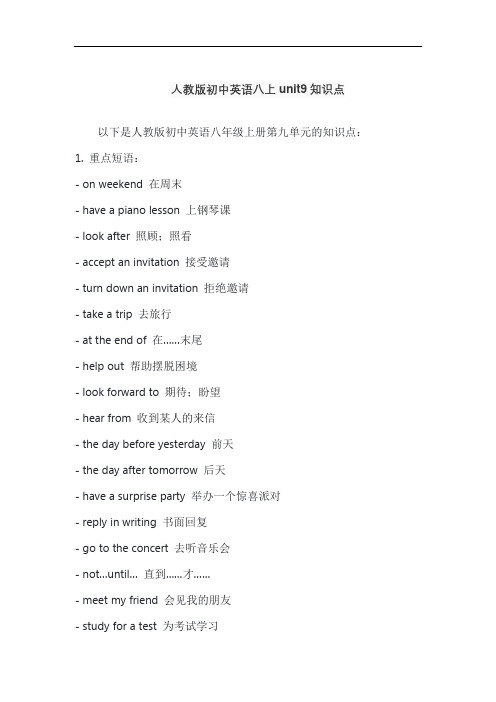
人教版初中英语八上unit9知识点以下是人教版初中英语八年级上册第九单元的知识点:1. 重点短语:- on weekend 在周末- have a piano lesson 上钢琴课- look after 照顾;照看- accept an invitation 接受邀请- turn down an invitation 拒绝邀请- take a trip 去旅行- at the end of 在……末尾- help out 帮助摆脱困境- look forward to 期待;盼望- hear from 收到某人的来信- the day before yesterday 前天- the day after tomorrow 后天- have a surprise party 举办一个惊喜派对- reply in writing 书面回复- go to the concert 去听音乐会- not…until… 直到……才……- meet my friend 会见我的朋友- study for a test 为考试学习2. 重点语法:- 用can 来表达邀请- Can you come to my party on Saturday?- Sure, I'd love to.- Sorry, I can't. I have to prepare for an exam.- 用must 来谈论职责和义务- I must finish my homework first.- I have to look after my sister.- 用might 来表示可能性- He might come to the party.- She might not be able to come.3. 重点句型:- Can you come to my party? 你能来参加我的聚会吗?- I'd love to, but I'm afraid I can't. 我很愿意,但恐怕不能。
八上英语单词讲解unit9

八上英语单词讲解unit9Unit 9的英语单词讲解如下:1. robot n. 机器人例句:The robot can perform a wide variety of tasks. 这个机器人能执行多种任务。
2. might v. 可能,也许例句:He might not come tomorrow. 他明天可能不来。
3. everything n. 每件事物例句:Everything is ready now. 现在一切都准备好了。
4. paper n. 纸例句:I need some paper to write on. 我需要一些纸来写字。
5. pen n. 钢笔例句:He wrote the letter with a pen. 他用钢笔写了那封信。
6. book n. 书例句:I borrowed a book from the library. 我从图书馆借了一本书。
7. dictionary n. 字典例句:She uses a dictionary to look up new words. 她用字典查找新单词。
8. postcard n. 明信片例句:I sent her a postcard from the seaside. 我从海边给她寄了一张明信片。
9. museum n. 博物馆例句:The museum is open from 9:00 am to 5:00 pm. 博物馆的开放时间是上午9点到下午5点。
10. art gallery n. 画廊例句:The art gallery is located in the center of the city. 画廊位于市中心。
人教版英语八年级上单词Unit9词汇讲解

Unit 9 Can you come to my party ?1. prepare v. 使做好准备;把......准备好prepare-preparing(现在分词要去e)prepare for为......做准备=get ready forprepare sth. 把某物准备好prepare sth. for...为.......准备某物be prepared for 准备prepare sb. for sth.使某人为某事做准备prepare to do sth.=get ready to do sth.准备做某事preparation n. 准备,准备工作make preparations for 准备2. exam n. =examination考试同义词:testan exam一次考试take/have an exam参加考试pass the exam通过考试,考试及格fail the exam考试不及格3. go to the/a doctor 去看医生=go to/see the/a doctor4. flu n. 流行性感冒;流感have the flu患流感表示“患病”的常用短语:have a cold 感冒have a cough 咳嗽have a fever 发烧have a sore throat 喉咙痛/ sore back 背疼have a headache 头痛have a toothache 牙痛have a stomachache 胃痛have a heart problem 心脏病5. available adj. 有空的=free 反义词:busy/fulladj.可获得的;可用的avail v. 有助于,(使)对某人有利拓展:v+able——adj.reliable(可以依靠的)drinkable(可以饮用的)eatable(可食用的)washable(耐洗的,可洗的)drinkable(可饮用的)movable (可移动的)readable(可读的)adjustable(可调节的)adaptable(可适应的)enjoyable(令人愉快的)valuable(有价值的)changeable(可改变的)(un)believable(难以置信的)/(可信的)comfortable(舒适的)reusable(可重复使用的)recyclable(可再循环的)suitable(适合的)acceptable(可接受的)6. another time 其他时间;别的时间on time准时(在规定的时间内完成某个动作)in time及时(指提前到达)at times 有时,时常=sometimes=from time to timeall the time 总是in no time 立刻,很快at a/one time 一次,每一次at the same time 同时at this time of day 在一天中的这个时间once upon a time 从前,很久很久以前have a good/nice/great time 玩得愉快the time=the minute=as soon as 一.......就......by the time 在......以前each time 每次,每当常用句型:What time is it?(=What’s the time?) 几点钟了?It’s time for/to do sth. 到做......的时间了。
人教版八年级上册英语-Unit-9单元知识点总结
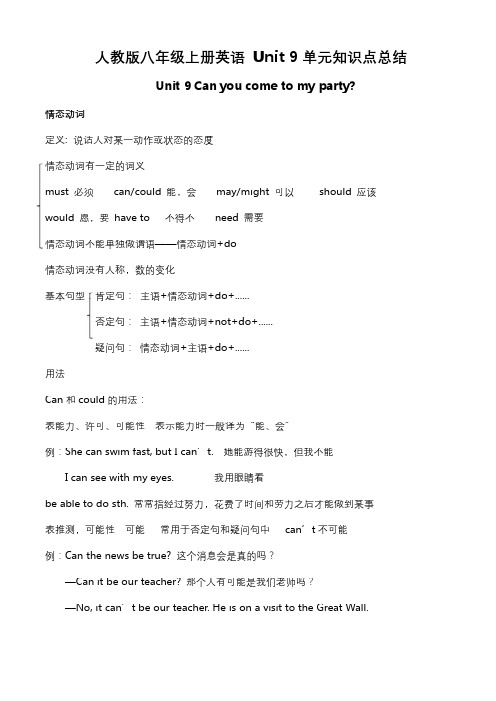
Unit 9 Can you come to my party? 情态动词定义: 说话人对某一动作或状态的态度情态动词有一定的词义must 必须can/could 能,会may/might 可以need 需要should 应该would 愿,要have to 不得不情态动词不能单独做谓语——情态动词+do情态动词没有人称,数的变化基本句型:肯定句:主语+情态动词+do+......否定句:主语+情态动词+not+do+......疑问句:情态动词+主语+do+......用法Can 和 could 的用法:表能力、许可、可能性表示能力时一般译为“能、会”例:She can swim fast, but I can’t.她能游得很快,但我不能I can see with my eyes. 我用眼睛看be able to do sth. 常常指经过努力,花费了时间和劳力之后才能做到某事表推测,可能性可能常用于否定句和疑问句中can’t不可能例:Can the news be true? 这个消息会是真的吗?—Can it be our teacher? 那个人有可能是我们老师吗?—No, it can’t be our teacher. He is on a visit to the Great Wall.could 在疑问句中,表示委婉的语气,此时could 没有过去式的意思例:—Could I use your pen? 我能用一下你的钢笔吗?—Yes, you can.可以(用 could 问,不能用 could 答。
)may 和 might 的用法表请求、许可,比 can 正式例:May I borrow your bike? 我可以借你的自行车吗?You may go home now. 现在你可以回家了表推测,谈论可能性可能,或许一般用于肯定句中may not 翻译为“可能不”例:It may rain tomorrow. 明天可能会下雨She may be at home. 她可能在家呢may 的过去式为 might ,表示推测时。
人教版八上Unit9单词表(轻松转EXCEL导入有道词典等APP的单词本)
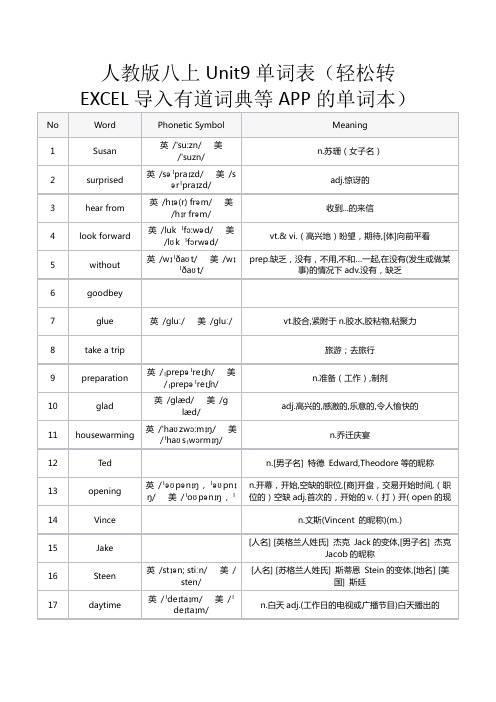
housewarming
英 /'haʊzwɔ:mɪŋ/ 美 /ˈhaʊsˌwɔrmɪŋ/
n.乔迁庆宴
12
Ted
n.[男子名] 特德 Edward,Theodore等的昵称
13
opening
英 /ˈəʊpənɪŋ , ˈəʊpnɪŋ/ 美 /ˈoʊpənɪŋ , ˈoʊpnɪŋ/
n.开幕,开始,空缺的职位,[商]开盘,交易开始时间,(职位的)空缺adj.首次的,开始的v.(打)开( open的现在分词),开始,睁开,启动
6
goodbey
7
glue
英 /ɡluː/ 美 /ɡluː/
vt.胶合,紧附于n.胶水,胶粘物,粘聚力
8
take a trip
旅游;去旅行
9
preparation
英 /ˌprepəˈreɪʃn/ 美 /ˌprepəˈreɪʃn/
n.准备(工作),制剂
10
glad
英 /ɡlæd/ 美 /ɡlæd/
adj.高兴的,感激的,乐意的,令人愉快的
20
headmaster
英 /ˌhedˈmɑːstə(r)/ 美 /ˌhedˈmæstər/
n.(私立学校的)校长
21
guest
英 /ɡest/ 美 /ɡest/
n.客人,旅客,特邀嘉宾,[动]寄生虫v.做特邀嘉宾,做客串,做特约演员
22
event
英 /ɪˈvent/ 美 /ɪˈvent/
n.事件,活动,比赛项目
人教版八上Unit9单词表(轻松转EXCEL导入有道词典等APP的单词本)
No
Word
Phonetic Symbol
Meaning
初中英语八年级上册 Unit 9(含答案解析)

一、选择题1.Shanghai is a wonderful city. I look forward to there.A.working B.work C.worked D.working in A解析:A【详解】句意:上海是一个非常好的城市。
我期望在那里工作。
本题考查非谓语动词。
working是现在分词或动名词;work是动词原形;worked是过去分词或过去式;working in在……工作,是现在分词或动名词;look forward to doing sth期望做某事,排除BC两项,there是副词,前面不用介词,排除D项,故选A。
2.Which pair of the words with the underlined letters has the same sound?A.invite print B.reply Friday C.glue blue C解析:C【详解】根据题意,哪对带下划线的单词发音相同?A. invite / aɪ / print / ɪ /;B. reply / aɪ /Friday/ ɪ / ; C. glue/ u: /;blue/ u: /,根据划线部分音标可知,故选C。
3.I’m having a guitar lesson_________Friday afternoon.A.in B.on C.at D.for B解析:B【解析】【详解】句意:在周五下午我正在上吉他课程。
A. in,加年,月,季节,一天的上午,下午或晚上;B. on加具体的日期,星期几,节日等;C. at加具体的时间点;D. for+一段时间,Friday afternoon是具体的周五下午用介词on。
根据题意,故选B。
【点睛】at表示时间的一点;in表示一个时期;on表示特殊日子。
例句:Can you finish the work in two days?你能在两天内完成这个工作吗?1. at后常接几点几分,天明,中午,日出,日落,开始等。
人教版英语八年级上册Unit9单词+课文+知识梳理
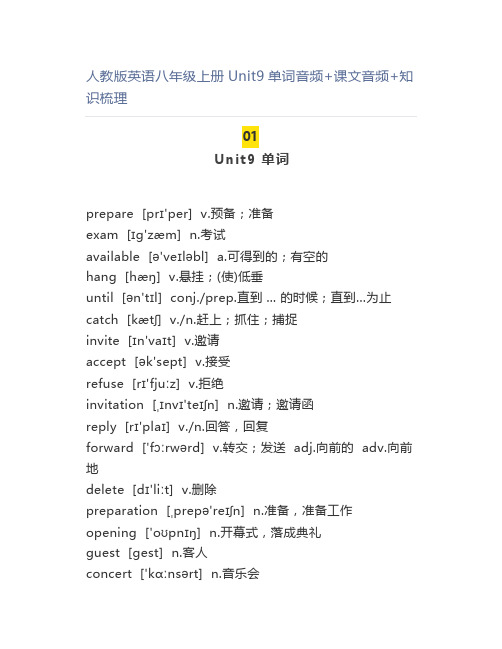
人教版英语八年级上册Unit9单词音频+课文音频+知识梳理01Unit9 单词prepare [prɪ'per] v.预备;准备exam [ɪɡ'zæm] n.考试available [ə'veɪləbl] a.可得到的;有空的hang [hæŋ] v.悬挂;(使)低垂until [ən'tɪl] conj./prep.直到 ... 的时候;直到…为止catch [kætʃ] v./n.赶上;抓住;捕捉invite [ɪn'vaɪt] v.邀请accept [ək'sept] v.接受refuse [rɪ'fjuːz] v.拒绝invitation [ˌɪnvɪ'teɪʃn] n.邀请;邀请函reply [rɪ'plaɪ] v./n.回答,回复forward ['fɔːrwərd] v.转交;发送 adj.向前的 adv.向前地delete [dɪ'liːt] v.删除preparation [ˌprepə'reɪʃn] n.准备,准备工作opening ['oʊpnɪŋ] n.开幕式,落成典礼guest [ɡest] n.客人concert ['kɑːnsərt] n.音乐会headmaster [ˌhed'mæstər] n.校长event [ɪ'vent] n.大事,公开活动calendar ['kælɪndər] n.日历,日程表02U n i t9课文03U n i t9知识梳理Unit9. Can you come to my party?【重点短语】1、on Saturday afternoon 在星期六下午2、have to 必须3、 prepare for 准备4、go to the doctor 去看病5、have the flu 患流感6、help my parents 给父母帮忙7、come to the party 参加晚会8、meet my friend 见朋友9、go to the party 参加晚会10、too much homework 太多的家庭作业11、go to the movies 去看电影12、another time 下次,另外的时间,别的时间13、last fall 去年秋天14、hang out 闲逛15、after school 放学后16、on the weekend=on weekends 在周末17、study for a test 备考18、visit grandparents 拜访爷爷奶奶19、the day before yesterday 前天20、the day after tomorrow 后天21、have a piano lesson 上钢琴课22、look after 照看23 make an invitation 制定邀请24、accept an invitation 接受邀请turn down (refuse) an invitation 拒绝邀请25、take a trip to Wuhan 去武汉旅游26、at the end of this month 在本月底27、look forward to + doing 期望/渴望28、the opening of… 开幕/开业29、reply in writing 写回信30、go shopping 购物31、do homework 做作业32、go to the concert 参加音乐会33、not…until… 直到......才......【重点句型】1. --Can you come to my party on Saturday afternoon?星期六下午你能参加我的晚会吗?--Sure, I’d love to. / Sorry,I can’t. I have to prepare for an exam.当然,我愿意去。
八年级英语上册Unit9Canyouetomyparty知识点归纳(新版)

Unit9 Can you e to my party?短语:1.on Saturday afternoon在周六下午2.prepare for为……做准备prepare to do sth 准备做某事3.go to the doctor去看医生4.have the flu患感冒5.help my parents帮助我的父母6.e to the party来参加聚会7.meet my friend会见我的朋友8..another time其他时间st fall=last autumn去年秋天10.go to the party去聚会11.hang out with sb 和某人一起闲逛12.the day after tomorrow后天the day before yesterday前天13.have a piano lesson上钢琴课14.accept an invitaton接受邀请14.turn down an invitation拒绝邀请15.look for寻找look after=take care of照顾16.take a trip去旅行17 at the end of this month这个月末 18.lookforward to doing盼望;期待19.the opening of… ……的开幕式/落成典礼 20.reply in writing书面回复21.go to the concert去听音乐会not…until直到……才22.too much homework太多作业do homework做家庭作业23.after school放学后24.help out分担工作,解决难题25,hear from sb 收到某人的来信26.any of the party preparations派对准备中的任何事用法:1.invite sb. to do sth.邀请某人做某事invite sb to sp 邀请某人去某地2.what引导的感叹句结构:What+a/an+adj.+可数名词单数(+主语+谓语)!What+adj.+名词复数/不可数名词(+主语+谓语)!5.see sb. do sth. see sb.doing sth.10.What’s today?今天是什么日子?What’s the date today?今天几号?What day is it today?今天星期几?11.Thanks for asking= Thanks for inviting = Thanks for your invitantion谢谢你的邀请12.refuse to do sth 拒绝做某事。
八年级上册unit9英语知识点

八年级上册unit9英语知识点Unit 9是八年级上册英语中的重点单元之一,主要涉及动词的时态、比较级和最高级、情态动词、被动语态等知识点。
本文将为大家详细讲解这些知识点。
1. 时态在Unit 9中,涉及的时态包括一般现在时、一般过去时、现在进行时、过去进行时和一般将来时等常见时态。
一般现在时表示现在经常或习惯性的动作或状态,它的构成为主语 + 动词原形。
例如:I usually play football after school.一般过去时表示过去某一时刻或一段时间内发生的动作或状态,它的构成为主语 + 动词的过去式。
例如:I went to the cinema last night.现在进行时表示正在进行的动作,它的构成为主语 + am/is/are+ 动词 + -ing。
例如:He is watching TV now.过去进行时表示过去某一时刻正在进行的动作,它的构成为主语 + was/were + 动词 + -ing。
例如:I was sleeping when you called me.一般将来时表示将来将要发生的动作或状态,它的构成为主语+ will + 动词原形。
例如:I will visit my grandparents next weekend.2. 比较级和最高级在Unit 9中,我们还需要掌握形容词和副词的比较级和最高级。
以英语中的形容词和副词为例,比较级和最高级的构成如下:形容词的比较级和最高级:比较级:原形 + -er,例如:bigger,more interesting.最高级:the + 原形 + -est,例如:the biggest,the most interesting.副词的比较级和最高级:比较级:原形 + -er,例如:faster,more quickly.最高级:the + 原形 + -est,例如:the fastest,the most quickly.需要注意的是,有些形容词和副词的比较级和最高级不是加 -er 或 -est,而是在前面加 more 或 most,例如:interesting,more interesting,the most interesting.3. 情态动词情态动词包括 can,could,may,might,will,would,shall,should,must,need,dare等,它们用来表示说话人的意愿、推测、建议等。
八年级上册英语unit9笔记
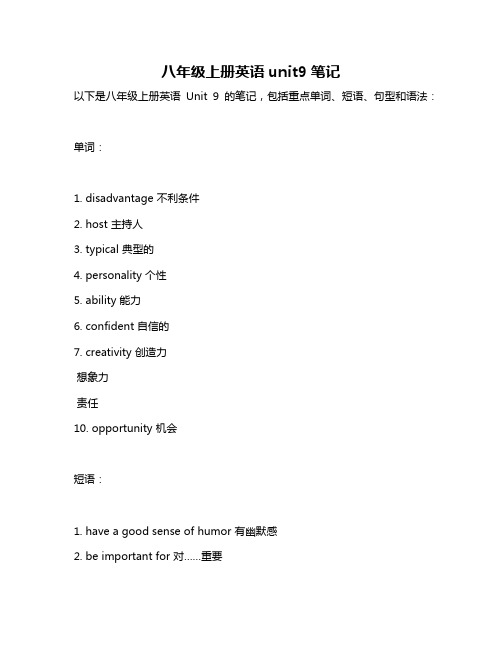
八年级上册英语unit9笔记以下是八年级上册英语Unit 9的笔记,包括重点单词、短语、句型和语法:单词:1. disadvantage 不利条件2. host 主持人3. typical 典型的4. personality 个性5. ability 能力6. confident 自信的7. creativity 创造力想象力责任10. opportunity 机会短语:1. have a good sense of humor 有幽默感2. be important for 对……重要3. be outgoing 外向的4. be friendly 友好5. be hard-working 勤奋的6. be creative 有创造力7. be creative in 在……方面有创造力8. perform well 表现得好9. take charge 负责10. care about 关心句型:1. What are the characteristics of a good friend? 一个好朋友应该具备哪些特点?2. He is always there when I need him. 我需要他的时候他总是在那里。
3. She is the most reliable person I know. 她是我认识的最可靠的人。
4. He has a good sense of humor and always makes me laugh. 他很有幽默感,总是能逗我笑。
5. She is very creative and often comes up with new ideas. 她很有创造力,经常能想出新点子。
6. He is always there to support me and give me encouragement. 他总是在那里支持我,给我鼓励。
7. She is always there to help me and make things easier for me. 她总是在那里帮助我,让事情变得更简单。
八年级英语上册unit9单词汇总(新人教版)
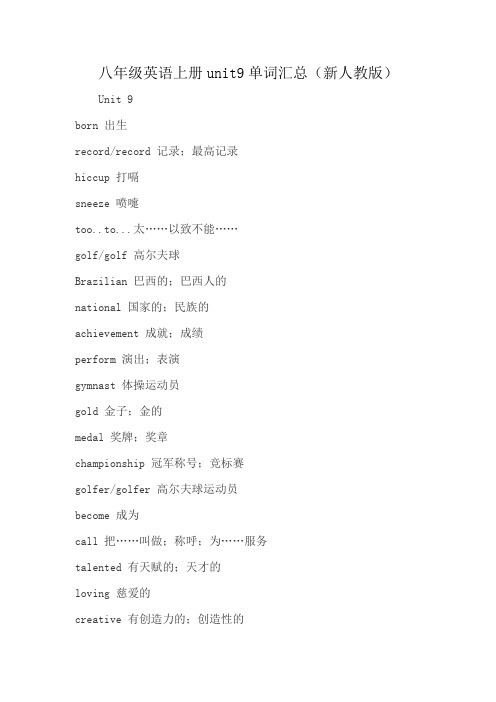
八年级英语上册unit9单词汇总(新人教版)Unit 9born 出生record/record 记录;最高记录hiccup 打嗝sneeze 喷嚏too..to...太……以致不能……golf/golf 高尔夫球Brazilian 巴西的;巴西人的national 国家的;民族的achievement 成就;成绩perform 演出;表演gymnast 体操运动员gold 金子;金的medal 奖牌;奖章championship 冠军称号;竞标赛golfer/golfer 高尔夫球运动员become 成为call 把……叫做;称呼;为……服务talented 有天赋的;天才的loving 慈爱的creative 有创造力的;创造性的outstanding 杰出的kind 和蔼的;亲切的unusual 不寻常的;罕见的grandson 外孙;孙子violinist 小提琴手skate 滑冰ice skating 滑冰champion 冠军tour/tour 观光;参观the U.S.=the Unite States 美利坚合众国;美国well-known 有名的;众所周知的pianist 钢琴手;钢琴家could 可能;可以hum 哼唱piece 幅;篇;首accordion 手风琴take part(in) 参加……;参与……Poland 波兰alive 活着的;在世的athlete 运动选手;运动员because of 因为;由于Asia 亚洲table tennis 乒乓球运动university 大学major 主修major in 主修;专研management 管理;经营number 号码;编号single 单打比赛ITTF=international Table Tennis Federation Martina Hingis 马蒂娜•辛吉斯(网球运动员)David Beckham 大卫•贝克汉姆Donna/Donna 丹娜Charles 查尔斯Tiger Woods 老虎•伍兹(高尔夫球运动员)Shirley Temple 秀兰•邓波(电影演员)Mozart 莫扎特Ronaldo 罗纳尔多Arthur 亚瑟Vivian 维维安Midori 梅多利Chopin 肖邦。
八上Unit9笔记(人教版)

八上Unit9笔记(人教版)Unit 9 Can you come to my party?Section Ae to + 地点“来到某地”2.On Saturday afternoon 在周六下午On, in, at接时间状语时的区别:(1)On 后常常接具体某一天或某一天的早午晚(2)In后常常接某一段时间或早午晚(3)At后常常接具体的某一时刻Eg: on Sunday 在周日;on May 1st 在五月一日;Monday morning 在周一上午;In a week 在一周里;in May 在五月;in the morning 在上午At 5:00 在五点3.Sure, I’d love to. 当然,我愿意去。
该答语常常用来回答Would you like to do sth. ? “你想要去做某事吗?”的结构。
如果不想做某事,则用Sorry, I’d love to, but ....或Sorry, I can’t.Eg: -- Would you like to go shopping with me ?“你想和我一起去购物吗?”-- Sure, I’d love to.4.Have to 不得不5.Prepare (动词) “准备”-- preparation (名词) “准备”Prepare for ...= get ready for ... 为...做准备Prepare to do sth. 准备做某事Eg: prepare for an exam 为考试做准备I am preparing to visit Beijing. 我准备参观北京。
6.Go to the doctor 去看医生Go to the movies 去电影院7.Have the flue 患流感表示“患病”的常用短语:Have a cold 感冒;have a cough 咳嗽;Have a fever 发骚;have a toothache 牙痛8.Too much + 不可数名词“太多...”Too many + 可数名词复数“太多...”Much too + 形容词“太...”Eg: There is too much water in the pool.池塘里有太多的水。
八年级英语上册-人教版-Unit 9 教案

八年级英语上册-人教版-Unit 9 教案一. 教材分析人教版八年级英语上册Unit 9主要围绕着“节假日”这一主题展开,通过学习本单元,学生能够掌握关于节日的词汇和表达方式,了解不同国家的节日习俗,提高听说读写的能力。
本单元包括两个阅读文本,分别是关于春节和西方节日的介绍。
二. 学情分析八年级的学生已经具备了一定的英语基础,能够听懂并运用简单的日常英语进行交流。
但部分学生在阅读和写作方面还存在一定的困难,对一些文化背景知识了解不足。
因此,在教学过程中,需要关注学生的个体差异,调动他们的学习积极性,提高他们的综合语言运用能力。
三. 教学目标1.知识目标:学生能够掌握关于节日的词汇和表达方式,了解不同国家的节日习俗。
2.能力目标:学生能够听懂、说清、读懂并写出一个关于节日的短文。
3.情感目标:培养学生对不同文化的尊重和理解,提高他们的跨文化交际意识。
四. 教学重难点1.重点:掌握关于节日的词汇和表达方式,了解不同国家的节日习俗。
2.难点:能够运用所学知识,编写一个关于节日的短文。
五. 教学方法1.任务型教学法:通过完成各种任务,激发学生的学习兴趣,提高他们的实践能力。
2.情境教学法:创设真实的语境,让学生在实践中学习,提高他们的语言运用能力。
3.文化教学法:介绍节日背后的文化背景,培养学生对不同文化的尊重和理解。
六. 教学准备1.教师准备:备好相关节日的教学材料,如图片、视频、阅读文本等。
2.学生准备:预习相关节日的词汇和表达方式,了解自己国家的节日习俗。
七. 教学过程1.导入(5分钟)教师通过提问方式引导学生谈论自己喜欢的节日,从而引出本课主题。
2.呈现(10分钟)教师展示与节日相关的图片和视频,引导学生用英语描述图片内容。
3.操练(15分钟)教师学生进行角色扮演,模拟节日场景,让学生在实际语境中运用所学知识。
4.巩固(10分钟)教师给出一个关于节日的句子,要求学生用所学的词汇和表达方式进行改写。
- 1、下载文档前请自行甄别文档内容的完整性,平台不提供额外的编辑、内容补充、找答案等附加服务。
- 2、"仅部分预览"的文档,不可在线预览部分如存在完整性等问题,可反馈申请退款(可完整预览的文档不适用该条件!)。
- 3、如文档侵犯您的权益,请联系客服反馈,我们会尽快为您处理(人工客服工作时间:9:00-18:30)。
Unit 9
教材的分析和作用
八年级上册第九单元,本课题为When was he born? 本单元主要以我们敬慕,
熟知的人物为话题,以人物简历为线索,进一步学习一般过去时态的使用,尤其
是一般过去时态的特殊疑问句。
继续巩固学习一般过去时态,同时学会谈论自己
崇拜的人,谈论自己和别人的过去和成就。
同时进一步提高学生的听,说,读,写综
合素质的能力。
教学目标:(知识目标能力目标德育目标)
知识目标:
掌握一般过去时态的特殊疑问句和when引导的状语从句
学会运用When ,How long引导的特殊疑问句。
掌握好部分重点词汇:record sneeze hiccup be born start doing sth.
stop doing too…to violinist pianist university accordion 等
能力目标:
听:能听懂谈论杰出人物的对话材料。
说:能够谈论自己过去的生活经历。
读:能读懂描述杰出文物的文章。
写:能够写介绍自己和周围同学的生活经历的短文。
德育目标:
通过了解名人的个人经历,学习他们积极上进努力奋斗的精神,同
时我们学到了何时开始做事都不为晚的道理。
重点与难点
重点:1)When/How long引导的特殊疑问句
be born start doing sth stop doing sth
难点:能灵活运用以下句型:
When was he born ?
When did he start / stop …..?
How long did he……..?
确立重点与难点的依据:根据教学大纲的要求,及本课在教材中所处的地位和作用。
学情分析:同学们在七年级已学过了一些词汇在一般过去时中的使用,unit8则
更系统地学习动词过去式的变化及其在疑问句和否定句重的应用。
学生对一般过
去时态已很熟悉,这为新知识的学习奠定了认知基础。
他们热爱和崇拜乔丹,邓
亚萍,贝克汉姆等名人,对他们的人生历程充满好奇,在教学中,教师可充分利
用学生这一心理,引导学生进行探究,让学生自主地解决问题,
教学方法设计:这次活动采用情景法,交际法及“任务型”教学途径并配以多媒体
辅助教学。
由于全班同学的英语水平参差不齐,有的基础一般的同学进行口语对话还存在一定的困难。
因此,必须采取分层递进的教学方法。
课堂上还用生动的语言、温柔的目光、信任的眼神加强师生间的情感交流;在轻松愉悦、民主和谐的环境气氛中,让学生积极主动参与,使学生产生了强烈的求知愿望。
从而亲其师,学其道。
同时对学生评价机会很多,对每一位(组)学生的发言,都给予积极的评价,评价中注意理解,尊重学生,让学生从评价中体验成长发展的快乐,受人赞赏的自豪和奋发向上的冲动。
教学应从学生感兴趣的问题入手。
比如说可以让学生在课堂上谈谈自己的偶像,或者让他们收集自己喜欢的明星照片。
这样不仅引起了他们的学习兴趣而且也增加了学习英语的真实性。
教学程序:
一、复习:复习月份、日期以及一般过去时,让学生翻译两个句子并就划线部分提问。
1. We went to the beach yesterday. When did you go to the beach?
2. She stayed in Hong Kong for 4 days. How long did she stay in Hong Kong?
学生在第3单元已学过了when 和how long特殊疑问句,做这两道题不难。
这样学生就能初步接触when和how long 在一般过去时态的应用。
(让学生回忆when对时间点进行提问,而how long是对时间段进行提问)从而为学生掌握when和how long从句做好铺垫。
二、新课导入:
北京奥运会在倒计时之计,奥运话题逐渐增温,课前让学生搜集世界体育明星的照片和资料。
上课时老师从简单提问导入新课题,由易到难,自然过渡。
First, I’d like to ask you some questions.Tom, please answer my questions. “How old are you? ”
Stude nt: “I am thirteen years old.”
Teacher: “Where were you born?”
Student: “I was born in Hang zhou.”
Teacher: “When were you born?”
Student: “I was born in 1990.”
Teacher: “OK. Sit down, please.”
Ask the class: “ When was he born?”
Students: “He was born in 1990.”
Teacher: “OK. That’s what we are going to learn today. When was he born?”
课题出现:Unit 9 When was he born? 通过教师创设的外部环境,学生立刻领悟到本课的主题,很快进入兴奋状态。
三、新课讲解:1活动Pairwork: 学生用How old… When…来操练并进一步引出
其他人称的运用。
2 老师呈现以下图片提问:How old is he ? And do you know who’s that? What’s
he/she? Where is he from? 学生对这些明星的很多情况都很熟悉,可是
不太熟悉他们的出生时间。
提出以上一系列问题后,就可引起学生的
好奇心,这时,让他们听录音,写下明星们出生的年份。
核对答案。
然后学生分角色朗读part 1c.然后对话。
看课件上明星的图片,问题或提示语在适当的时候显示出来。
学生在老师引导下对话:)eg: Teacher: “Who’s that?”
Students: “That’s Michael Jordan.”
Teacher: “He is a …?”
Students: “He is a basketball player.”
Teacher: “Wh en is he from?
Stud ents: “America.”
Teacher: “He is an American basketball player.”
“When was he born?”
Student: “He was born in 1963.”
(老师继续田亮,刘翔,邓亚萍等一组照片来练习用句型Who’s that? 和When was he\she born?与学生对话。
活动2 学生按小组用他们自己准备的有关明星的材料自主对话。
最后请几组同学演示。
3 呈现图片学习新单词:hiccup sneeze hold the record 等
然后学生做笔头练习P55和听力练习Page 56. Part 2a 2b.学生听录音、填表格。
核对答案。
学生
利用2b的内容完成Part 2c. 填空。
4 语法项目小结
讲解语言点和学习grammar focus。
尽量用学过的语言来解释新的知识,通过做就划线部分提问,创设情景提问和造句等形式操练,使课文的重点短语和语法知识融会在一定的语境中,启发引导他们归纳when和 how long在一般过去时态的用法。
这样本课的难点就迎刃而解啦。
四、巩固练习:
活动3 教师课前制作My first time的表格。
课上发给学生:
学生两人一组结队活动,互相提问,学生分别讲述自己同伴的相关情况。
让学生通过描述自己的种种第一次,对人生第一次回顾,学生熟悉并使用叙述以往经历的语言。
学习When did you start .....? How long did you…..?句型
五、作业
Exercisebook1and2.
1 . 看图写单词
2 . 看表格回答问题(复习一般过去时)
3 . 看答案,写问题(同上)
4 . 改错(复习一般过去时)
总之,本单元教学设计的思路能遵循学习认知规律。
同时通过设疑,提问,启发,诱导等方法,唤醒全体学生的主体意识,从而能调动学生的积极性,让学生处于积极思维状态之中,全方位,多角度培养学生运用语言的能力。
进行听,说,读,写操练,使整个教学从知识的内化到外显呈现一种动态的,和谐的发展过程。
板书设计说明:
通过呈现key words和重点句型这种板书设计既简单明了,同时能使学生思路清晰,加深对句型的理解,也使教师不会遗忘教学要点,并突出教学重点,有效提高教学效果。
